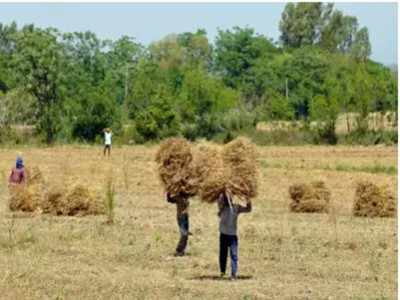Top Searches
- News
- India News
- Punjab keeps up its record despite lockdown hurdles
Punjab keeps up its record despite lockdown hurdles

Image used for representative purpose
CHANDIGARH: The lockdown couldn’t have come at a worse time for farmers in Punjab. With thousands of combine harvesters stuck in parts of MP, Rajasthan and Gujarat in late March, it was no small miracle that they finished harvesting the state’s biggest rabi crop in time.
While the curfew posed a hurdle for moving the crop to the state’s 3,800 notified mandis, the government’s bigger worry was preventing the spread of Covid-19 among farmers, labourers, arhtiyas (commission agents) and others involved in procurement. So, it deferred the start of procurement from April 1 to April 15, and staggered the arrival of farmers with coupons issued via the arhtiyas to ensure social distancing.
The measures worked as Punjab — the biggest contributor of wheat and paddy to the national grain buffer — recorded the arrival of 127 lakh metric tonnes (LMT) of wheat till May 26, just a little less than last year’s 132 LMT.
Now that the wheat procurement season is ending, Punjab’s farmers are faced with a severe labour shortage for transplanting paddy — the state’s biggest kharif crop. The lockdown has delayed the arrival of field hands from UP and Bihar and farmers are worried they might stay away this year altogether. Usually, the migrants start arriving by the first week of June, and are contracted at fixed rates, ranging from Rs 2,400-3,000 per acre. Paddy transplantation begins by June 15.
Palwinder Singh, a farmer in Gurdaspur’s Sahari village, said shortage of migrant labourers is a big worry. “Last year, I paid Rs 2,400-2,500 per acre to the labourers. With migrant labour unavailable, locals are demanding up to Rs 6,000 per acre. I might have to opt for direct seeded rice (DSR) sowing on my 22 acres.” Most farmers still grow paddy the traditional way by transplanting saplings from nurseries to puddled fields.
Dhanwant Singh Bhullar of Ramnagar village, in Muktsar district, said wages for farm labour have doubled to Rs 4,000-5,500 per acre. Concerned by the labour shortage, Punjab government is pushing the DSR technique, offering 40-50% subsidy on DSR machines. It’s also advising farmers to switch to other kharif crops like cotton, maize, oilseeds and pulses. However, farmers might stick with paddy due to its assured procurement by government.
While the curfew posed a hurdle for moving the crop to the state’s 3,800 notified mandis, the government’s bigger worry was preventing the spread of Covid-19 among farmers, labourers, arhtiyas (commission agents) and others involved in procurement. So, it deferred the start of procurement from April 1 to April 15, and staggered the arrival of farmers with coupons issued via the arhtiyas to ensure social distancing.
The measures worked as Punjab — the biggest contributor of wheat and paddy to the national grain buffer — recorded the arrival of 127 lakh metric tonnes (LMT) of wheat till May 26, just a little less than last year’s 132 LMT.
Now that the wheat procurement season is ending, Punjab’s farmers are faced with a severe labour shortage for transplanting paddy — the state’s biggest kharif crop. The lockdown has delayed the arrival of field hands from UP and Bihar and farmers are worried they might stay away this year altogether. Usually, the migrants start arriving by the first week of June, and are contracted at fixed rates, ranging from Rs 2,400-3,000 per acre. Paddy transplantation begins by June 15.
Palwinder Singh, a farmer in Gurdaspur’s Sahari village, said shortage of migrant labourers is a big worry. “Last year, I paid Rs 2,400-2,500 per acre to the labourers. With migrant labour unavailable, locals are demanding up to Rs 6,000 per acre. I might have to opt for direct seeded rice (DSR) sowing on my 22 acres.” Most farmers still grow paddy the traditional way by transplanting saplings from nurseries to puddled fields.
Dhanwant Singh Bhullar of Ramnagar village, in Muktsar district, said wages for farm labour have doubled to Rs 4,000-5,500 per acre. Concerned by the labour shortage, Punjab government is pushing the DSR technique, offering 40-50% subsidy on DSR machines. It’s also advising farmers to switch to other kharif crops like cotton, maize, oilseeds and pulses. However, farmers might stick with paddy due to its assured procurement by government.
FacebookTwitterLinkedinMail
Start a Conversation
end of article
Trending Topics
Quick Links
Coronavirus in MumbaiCoronavirus in KolkataCoronavirus in HyderabadCoronavirus in DelhiCoronavirus in BangaloreCoronavirus symptomsCoronavirus in IndiaWhat is CoronavirusCoronavirus NewsSolar EclipseNPRWhat is NRCCAB BillCAB and NRCRTI BillPodcast newsLok SabhaShiv SenaYSRCPCongressBJP newsUIDAIIndian ArmyISRO newsSupreme Court